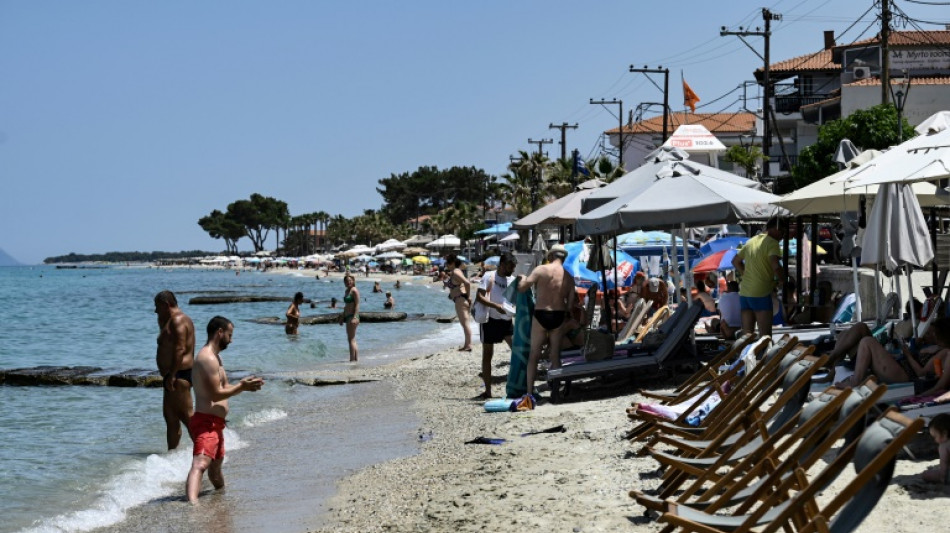
Sunbed wars: Greece tries to rein in beach chaos

The waves of the Aegean Sea lap gently at the tables and chairs of two beach restaurants on Greece's Halkidiki peninsula.
It is an idyllic scene, but one that is totally illegal.
Like many others in Greece, the two establishments on Pefkochori beach do not have a licence to set up shop so close to the water.
But after a wave of protests last summer by locals about bars and restaurants illegally covering beaches with sunbeds and tables, the Greek state is taking action.
It is cracking down on rogue tourist practices with surveillance drones, satellite imagery and a special app on which people can complain.
Pensioner Evgenia Rapti, who has a summer home near Pefkochori beach, is one of many outraged by the inexorable growth of Greece's tourism industry.
- Beach takeover -
"The whole beach has been taken over" with tables, chairs and deckchairs, the 64-year-old pensioner told AFP in the northern resort.
"When we bought our house 40 years ago, it was completely different," she recalled wistfully. "The beach was empty and it was nice to lie there."
Greece's travel sector has rebounded with a vengeance from the Covid pandemic -- but the downside is overtourism.
Last year, nearly 33 million people visited Greece, five million more than in 2022.
Renting two mattresses and a parasol for a day on the beach in Greece usually costs between 20 and 40 euros ($21-43).
Prices are much higher still on some top islands.
But a pushback has begun.
"The problem with beaches in Greece is entrepreneurs who, either with a permit or through encroachment, cover parts of the coast with sunbeds, umbrellas, tables and even permanent structures," said beach activist George Theodoridis, who is part of a Halkidiki group that has over 12,000 members on Facebook.
The first drone flights to spot the rule breakers in Pefkochori began in May.
And some 6,000 complaints from the public have been logged nationally on the new official MyCoast app since April, including 680 for the Halkidiki region east of the second city Thessaloniki.
"I can click directly in the app at the location where I am and file a report saying that (this private operator) does not have a licence," Theodoridis said.
Under the new rules introduced in March, umbrellas and deck chairs must be at least four metres from the sea. And no rentals are allowed on beaches that have less than four metres of sand.
In some cases, the added scrutiny has borne results.
On the popular tourist island of Rhodes, officials recently suspended the operation of a beach bar who had even put sunbeds in the sea.
- 'Order on the shore' -
"When we say there will be order on the shore, we mean it," said Finance Minister Kostis Hatzidakis.
His ministry expects to award more than 1,200 new beachfront leases this year in a bid to regularise the situation, on top of the 6,500 that already exist.
The new rules come after a backlash last summer that became known as the "beach towel movement".
It began on the Aegean island of Paros and spread nationally, with thousands protesting on illegally occupied beaches forcing the authorities to take notice.
But the new system is not without shortcomings.
Tourism operators say state services handling their applications are severely understaffed.
Anastasia Halkia, the mayor of the Halkidiki municipality of Kassandra, said inspections there that used to be handled by five local councils have fallen to two staff from the state land service, one of whom just retired.
"It's something new, so we are all moving gingerly to see how it goes," she said.
Sofia Papagiannidou, a 23-year-old tourism manager, said her company had submitted all the required paperwork -- but was still waiting even though the season was already underway.
"I have no faith in the Greek state," said another operator who declined to be identified.
"My business was fined 39,000 euros last year, and the procedure to collect the fine is still incomplete.
"So technically we have no licence to operate, but we are still working" unofficially, he said.
(V.Varonivska--DTZ)
